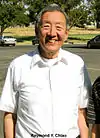Raymond Chiao
Raymond Y. Chiao is an American physicist best known for his experimental work in quantum optics. He is currently an emeritus faculty member at the University of California, Merced physics department, where he is conducting research on gravitational radiation.
Raymond Y. Chiao | |
|---|---|
 Raymond Chiao outside his UC Merced Lab | |
| Born | October 9, 1940 |
| Nationality | United States |
| Alma mater | MIT Princeton University |
| Known for | Measuring the tunneling time, observation of Berry's topological phase |
| Awards | Willis E. Lamb Award for Laser Science and Quantum Optics (2006) Einstein Prize for Laser Science (awarded at Lasers '93) |
| Scientific career | |
| Fields | Physics |
| Institutions | UC Merced Berkeley MIT |
| Doctoral advisor | Charles Hard Townes |
Biography
Raymond Chiao was born in Hong Kong on Oct. 9, 1940, and moved as a child to the United States in 1947. He grew up in New York City, where he attended Collegiate School. It was there that he first got interested in science through reading Gamow’s book One Two Three... Infinity.
He was admitted to Princeton University in 1957 as an electrical engineer, but then switched to the physics department, where he worked on a senior thesis project given to him by John Archibald Wheeler on the quantization of general relativity. He then switched from theoretical physics to experimental physics in graduate studies at MIT under the supervision of Charles Hard Townes, shortly after the experimental realization of the ruby laser. His thesis topic was on the first observation of stimulated Brillouin scattering.
After obtaining his Ph.D. in 1965 from MIT, he taught as an assistant professor there until 1967. He moved to UC Berkeley in 1967, and remained there until 2006, after which he took a position at the UC's newly opened campus UC Merced.
Discoveries
Chiao has become well known in the field of quantum optics due to several important experiments. Based on former experiments carried out by Günter Nimtz in 1992[1] he measured the quantum tunnelling time, which was found to be between 1.5 and 1.7 times the speed of light. Interpretation of these results is open to question (see references below pertaining to tunneling time). He also was the first to measure the topological Berry's Phase (Geometric phase).
Current work
As of 2006, he accepted a faculty position at UC Merced and turned his full energy on the project of detecting gravitational waves through the use of superconductors. As of 2010 he became emeritus faculty but he continues to advise several PhD Students.
Bibliography
Books
- Quantum Optics by John Garrison, Raymond Chiao
- Amazing Light by Raymond Chiao
Articles
- A. M. Steinberg and R. Y. Chiao Tunneling delay times in one and two dimensions Phys. Rev. A 49, 3283 - 3295 (1994)
http://prola.aps.org/abstract/PRA/v49/i5/p3283_1
- A. Tomita and R. Y. Chiao Observation of Berry's Topological Phase by Use of an Optical Fiber Phys. Rev. Lett. 57, 937 - 940 (1986)
http://prola.aps.org/abstract/PRL/v57/i8/p937_1
- Steinberg, A. M., Kwiat, P. G. & R. Y. Chiao 1993: "Measurement of the Single-Photon Tunneling Time" in Physical Review Letters 71, S. 708–711
References
- Enders, A.; Nimtz, G. (1992). "On superluminal barrier traversal". J. Phys. I France. 2 (9): 1693–1698. Bibcode:1992JPhy1...2.1693E. doi:10.1051/jp1:1992236.
External links
- Tunnelling time
- http://scienceworld.wolfram.com/physics/TunnelingTime.html
- http://www.aei.mpg.de/~mpoessel/Physik/FTL/tunnelingftl.html
- http://www.lambmedal.org/2006/2006-chiao.html
- Media coverage
- http://physicsworld.com/blog/2009/04/can_gravitional_waves_be_detec.html
- https://web.archive.org/web/20081030003747/http://edition.cnn.com/2000/TECH/space/07/20/speed.of.light.ap/
- https://www.nytimes.com/2002/03/26/science/discussing-the-nature-of-reality-between-buffets.html
- https://www.nytimes.com/2002/03/26/science/discussing-the-nature-of-reality-between-buffets.html
- http://www.sfgate.com/cgi-bin/examiner/article.cgi?year=1997&month=08&day=11&article=NEWS378.dtl
- http://www.scientificamerican.com/article.cfm?id=a-philosophers-stone
- http://www.ucmerced.edu/news/2005/renowned-berkeley-physicist-raymond-chiao-join-uc-merced-faculty